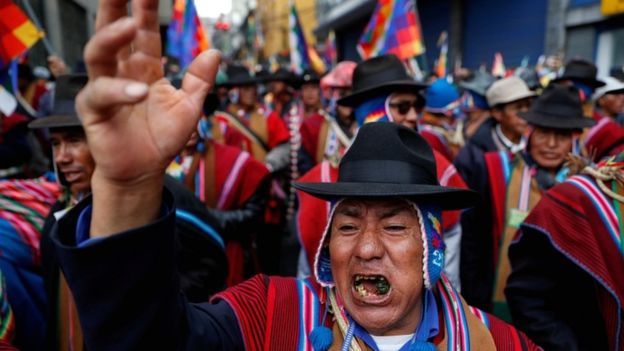
Bolivia’s interim president has told the BBC her exiled predecessor, Evo Morales, should face prosecution if he returns to the country.
Interim leader Jeanine Áñez says he is breaking the conditions of his asylum by continuing to engage in politics.
Mr Morales, leftwing and from the indigenous community, fled to Mexico after the military urged him to quit.
His supporters continue to protest against what they say is a military coup.
“He should face justice – because Evo Morales left in the most cowardly way. He knows he must answer to the country’s justice system. And he is breaking all of the protocols of asylum by openly engaging in politics, which isn’t permitted when one is granted asylum,” she told the BBC.
“The Bolivian people have reclaimed the right to elect their authorities. That is what’s behind all this chaos. Evo Morales led us to an election on 20 October and what took place was a blatant fraud.”
Such arguments will only further anger and concern Morales supporters who fear their rights, especially as indigenous people, will be attacked under the new government, says the BBC’s Will Grant in La Paz.
Ms Áñez, an opposition senator, assumed the presidency amid a power vacuum and has vowed to hold elections soon. She denies a coup has taken place against Mr Morales.
On Wednesday, supporters of Mr Morales clashed with riot police, while lawmakers loyal to him sought to challenge the legitimacy of Ms Áñez’s appointment.
His resignation followed weeks of protests over the disputed presidential election result.
He said he was forced to stand down, but did so willingly “so there would be no more bloodshed”.
At least 10 people have been killed in recent clashes over his resignation, and there is a heavy military presence around all main government buildings.
The US recognised Ms Áñez as leader, saying it looked forward to working with Bolivia’s interim administration.
How did we get here?
Mr Morales, a former coca farmer, was first elected in 2005 and took office in 2006, the country’s first leader from the indigenous community.
He won plaudits for fighting poverty and improving Bolivia’s economy, but drew controversy by defying constitutional limits to run for a fourth term in October’s election.
Pressure had been growing on him since contested election results suggested he had won outright in the first round. The result was called into question by the Organization of American States, a regional body, which had found “clear manipulation” and called for the result to be annulled.
In response, Mr Morales agreed to hold fresh elections. But his main rival, Carlos Mesa – who came second in the vote – said Mr Morales should not stand in any new vote.
The chief of the armed forces, Gen Williams Kaliman, then urged Mr Morales to step down in the interests of peace and stability.



